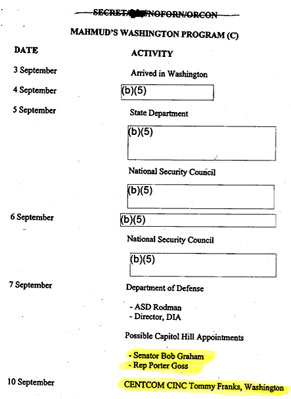Whether it was the hunt for Osama bin Laden or secret airstrikes on Taliban forces in the badlands of Pakistan's border with Afghanistan, much of the Bush administration's war on terrorism has hinged on its relationship with general-turned-president Pervez Musharraf. - lat
Considering that Musharraf's Lieutenant-General Mahmoud Ahmad (then head of the Pakistani ISI) was the "money man" who paid lead 9/11 hijacker Mohammed Atta over $100,000, and that Ahmed was meeting with key members of our government when the jets hit the buildings, I'll express my relief when the neocons exit.
The following images are from documents about Ahmad released by the Department of Defense due to a Freedom of Information request. They were found on truthnews.us:


Mahmood instructed Saeed to transfer $100,000 into hijacker Mohamed Atta’s bank account prior to 9/11. This is according to Indian intelligence, which claims the FBI has privately confirmed the story. [Press Trust of India, 10/8/2001; Times of India, 10/9/2001; India Today, 10/15/2001; Daily Excelsior (Jammu), 10/18/2001] The story is not widely reported in Western countries, though it makes the Wall Street Journal. [Australian, 10/10/2001; Agence France-Presse, 10/10/2001; Wall Street Journal, 10/10/2001] It is reported in Pakistan as well. [Dawn (Karachi), 10/8/2001] The Northern Alliance also repeats the claim in late October. [Federal News Service, 10/31/2001] In Western countries, the usual explanation is that Mahmood is fired for being too close to the Taliban. [London Times, 10/9/2001; Guardian, 10/9/2001] The Times of India reports that Indian intelligence helped the FBI discover the link, and says, “A direct link between the ISI and the WTC attack could have enormous repercussions. The US cannot but suspect whether or not there were other senior Pakistani Army commanders who were in the know of things. Evidence of a larger conspiracy could shake US confidence in Pakistan’s ability to participate in the anti-terrorism coalition.” [Times of India, 10/9/2001] There is evidence some ISI officers may have known of a plan to destroy the WTC as early as July 1999. Two other ISI leaders, Lt. Gen. Mohammed Aziz Khan and Lt. Gen. Muzaffar Usmani, are sidelined on the same day as Mahmood (see October 8, 2001). [Fox News, 10/8/2001] Saeed had been working under Khan. The firings are said to have purged the ISI of its fundamentalists. However, according to one diplomat, “To remove the top two or three doesn’t matter at all. The philosophy remains.… [The ISI is] a parallel government of its own. If you go through the officer list, almost all of the ISI regulars would say, of the Taliban, ‘They are my boys.’” [New Yorker, 10/29/2001] It is believed Mahmood has been living under virtual house arrest in Pakistan (which would seem to imply more than just a difference of opinion over the Taliban), but no charges have been brought against him, and there is no evidence the US has asked to question him. [Asia Times, 1/5/2002] He also has refused to speak to reporters since being fired [Associated Press, 2/21/2002] , and outside India and Pakistan, the story has only been mentioned infrequently in the media since. [Sunday Herald (Glasgow), 2/24/2002; London Times, 4/21/2002] He will reemerge as a businessman in 2003, but still will not speak to the media (see July 2003). - historycommons
More details here.
No comments:
Post a Comment